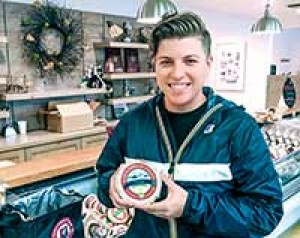HEATHER FRAMBACH (2009)

BACK IN 2015, HEATHER FRAMBACH was nervous about her decision to join Blue Apron, the world’s largest meal kit delivery corporation. All of her prior work in the public sector, which had taken her to Texas and back to California, was about social justice in food systems.
“Making that switch was a little scary to me. I was so committed to the work I was doing and making sure the little guys were taken care of,” she says. But Frambach says her values easily translated to Blue Apron, where sustainability and working with small farmers and producers are part of the larger corporate culture.
During school, Frambach worked at a local Murphy’s Market and as a delivery driver for Franz bakery—two jobs that would provide a direction for her career. “I got interested in food systems: logistics, retail, distributors,” she says. “That interest never went away.”
After she graduated, she joined AmeriCorps in Sacramento, hoping to pursue a path in urban planning. But the most interesting part of the job, she says, was managing a farmers market in a historically black neighborhood. The market was a success and continues to this day. Food systems can be changed quickly, she says, unlike housing and other urban planning projects.
Frambach moved to Texas in 2010 to attend grad school at the University of Texas at Austin. Half Mexican and a Spanish speaker, Frambach, who was a researcher for the Austin sustainable food policy board and co-manager of another farmers market, worked with women sweatshop laborers in solidarity along the U.S.-Mexico border. But once again she got bitten by the food bug.
Food in Austin was seeing a surge in opportunity, interest, and conflict, especially in the historically black and Mexican east side of the city, which was gentrifying rapidly. In the 1990s, those communities came together to clean up the remnants of decades of toxic industry in their neighborhoods. Before long, urban farmers began to set up shop. Their agricultural practices—particularly one sustainable, but smelly chicken and rabbit farm—created huge controversies with their neighbors, who’d worked hard to rid their neighborhoods of smelly, noisy industries that crowded them.
The mostly white urban farmers—well-intentioned but playing into troublesome past neighborhood dynamics, Frambach says—began to rally their own support, and tensions were growing on both sides.
In the middle of all this were 25-year-old Frambach and her colleague. They took the daunting but hugely rewarding task with gusto, undertaking a transparent and careful process to hear all sides and craft new policies and ordinances in the neighborhoods. It worked, she says, and the city’s new, careful approach to urban farming—as well as a newfound understanding between the communities—has eased tensions.
After Austin, Frambach returned to California, doing a stint at Community Alliance with Family Farmers, working on statewide programs to connect school kids to healthy food, before joining Blue Apron. Now she’s the dairy category manager for the meal delivery company, which means she’s traveling all over the country meeting with dairy farmers and manufacturers to fulfill the 300,000-plus meals the company ships weekly.
Overcoming her fears of going corporate, Frambach says the company always supported her desire to seek out small and mid-sized food producers that would guarantee fresh, quality, sustainable foods. Add to that the company’s waste reduction efforts, donation programs, commitment to nutrition and food safety, and Frambach’s proud to be where she is.

